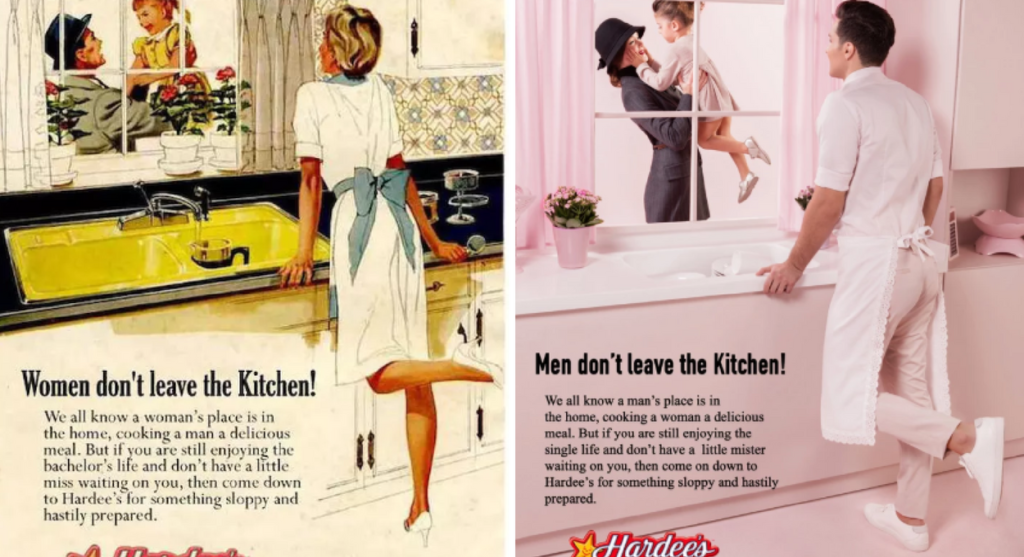Have you ever heard of the term ‘feminine mystique’?
Honestly, I’ve heard people toss around this phrase, and for some reason, I believed it was synonymous with ‘feminine wiles.’
And let me tell you, it most certainly is not!
So now that we know what it’s not – what is the feminine mystique?
A revolutionary thinker and feminist, Betty Friedan, coined this term almost 60 years ago. It suggests that women can find fulfillment solely through housework, marriage, and child-rearing.
Sounds archaic, right?
Well, that’s because it is. So, why even bother talking about it?
Because that age-old assumption has shaped and still affects how we as a society function today.
Gender Roles and Stereotypes
Society usually defines gender roles as socially acceptable behaviors and attitudes – determining how individuals are expected to speak, act, and dress.

For example, when someone tells you to ‘sit like a lady’ or ‘chew like a lady’; they’re addressing the fact that you’re not behaving according to their preconceived notions of how a ‘lady’ should behave.
Whereas, gender stereotypes can be better understood by splitting them into four basic categories:
- Personality traits – The most common stereotype would be that women are expected to be more emotional than men.
- Domestic behaviours – The expectation that women take care of the children and the house while men ‘take care of business’.
- Occupations – Job roles that are nurturing and ‘caregiving’ in nature are assumed to be more fitting for women than men.
- Physical appearance – An example of this would be that women are meant to be small and dainty with long hair.
Society ingrains these ideas about gender roles and stereotypes into our lives from a very young age. In fact, studies have shown that by around age 2, children become aware of the physical differences between genders. By age 3, most children are able to label themselves as a girl or boy.
Our society embeds gender roles and stereotypes so deeply that we often fail to recognize them. And the consequences of this have far-reaching effects.
So, what are the Consequences of these Gender Roles and Stereotypes?
Well, this systemic problem has created an expectation that women should take on a lion’s share of household responsibilities.
And it’s not just adult women!
According to a 2016 UNICEF report, Girls aged 5-15 spent 40% more time (which is approximately 160 million hours a day) on unpaid household chores than boys.
According to a 2016 UNICEF report, Girls aged 5-15 spent 40% more time (which is approximately 160 million hours a day) on unpaid household chores than boys. Share on XAs a consequence, not only are these girls missing out on a chance to just enjoy their childhood the same as their male counterparts, they’re also sacrificing important opportunities to learn and grow, and break the cycle.
Unpaid Care Work: What is it? Who’s doing it?
In 2016, the Workplace Gender Equality Agency (Australian) looked into the nitty gritty of unpaid care work, which they defined as domestic work: cooking, cleaning, washing, gardening and home maintenance. They also included taking care of children, the eldery or family members with a disability/long-term health condition as a part of it.
Economists have termed this type of work ‘household production’, and it is considered essential to both the social and economic wellbeing of society as a whole.
In fact, they even found that the monetary value of unpaid care in Australia alone is estimated to be around $650 billion.
The monetary value of unpaid care in Australia alone is estimated to be around $650 billion.
Now, I’m sure you already know who’s doing a majority of this work..
In your household, more than likely it’s YOU!
But, it’s not just you and your household…
Women around the world traditionally devote more time to unpaid work than men
In Australia women spend 64.4% (men spend only 36.1%) of their weekly time on unpaid work.
To put it simply, for every hour an Australian man spends on household chores and childcare activities, an Australian woman commits 1 hour and 48 minutes.
Moreover, one American study found that the kind of household activities that men and women perform was significantly influenced by perceived gender roles and stereotypes.

So more women were responsible for traditionally feminine jobs – such as laundry (58%), cooking and cleaning (51%). While men took the lead on things like maintaining the car (69%) and doing ‘yardwork’ (59%).
Additionally, when it came to childcare, a study conducted by Penn State showed that overall dads were happier, less stressed and less tired than mums.
And this study only highlighted the fact that certain aspects of parenting are less enjoyable than others. Usually, it’s the mums who end up taking charge of them. Also not only were these activities less enjoyable. They were more likely to involve an infant and fit into the category of ‘solo-parenting’ – parenting without a partner present.
Whereas dads’ childcare activities were more likely to be recreational and often took place on the weekends.
If there’s a Strong Woman Behind Every Businessman, then Who’s Behind Every Businesswoman?
See, the logical answer would be a man… which may be true in some cases. Fempire’s founder and CEO, Marnie LeFevre has an extremely supportive husband, so that’s one.
But, even though the amount of housework done by men has increased. Over the last few decades, the proportion of women who are bearing the burden of housework remains higher than their male counterparts.
Which is why it’s up to us, as women and future leaders, to break down these stereotypes.
“While it’s perfectly alright to show gratitude, let’s stop celebrating men for doing the bare minimum. We need to start expecting more from the men in our lives.”
However, deeply entrenched gender roles and behaviours can be incredibly difficult to change.

So, instead of trying to bring down the patriarchy, try affecting change on an individual level.
And by that I mean challenge these stereotypes – ask a male colleague. About removing tough stains, ask male leaders how THEY balance their personal and professional lives. Talk to the men in your life about the roles they play and actions they take in their everyday lives.
The expectation that woman should spend the entire day working only to come home and take care of the house and kids. While your partner relaxes on the couch and drinks a beer needs to change.
And that change starts with all of us. With setting boundaries and raising expectations.
A businesswoman doesn’t need a wife – she needs a partner who helps share the responsibility so that together they can build a life they are proud of.
What do you think? Let us know in the comments below xx
______________________________
Are you thinking about becoming a Business Coach but not sure where to start? We can help! Fempire is the number one business coaching brand for women!
You can book a call right now to learn more about how you can become a Fempire Certified Business Coach! Book a call here.

Naomi D’Roza is a PR intern at Fempire. With a penchant for writing, Naomi wants to create content that inspires and empowers women to live their best lives.





0 Comments